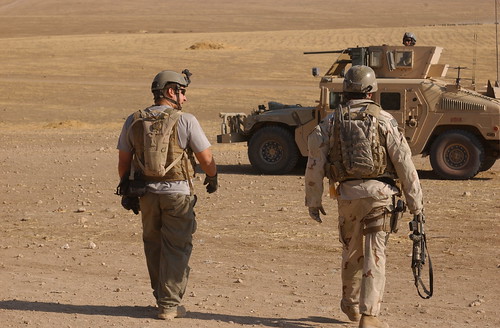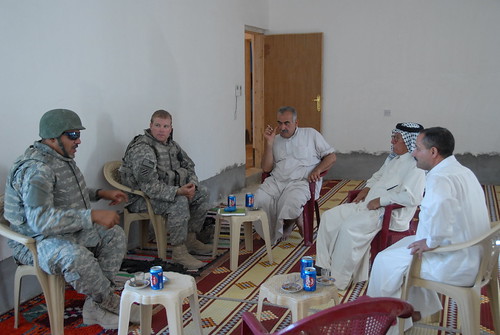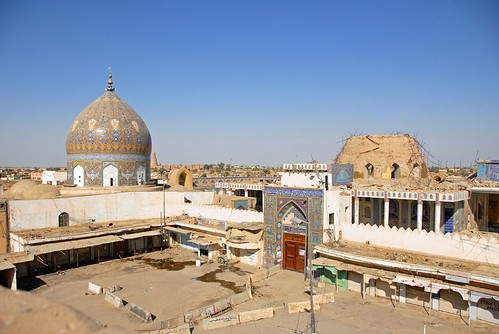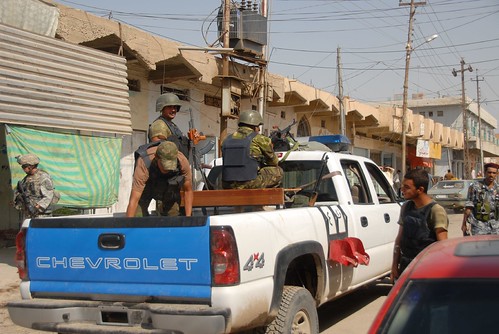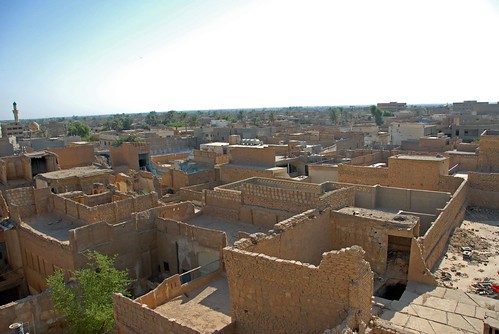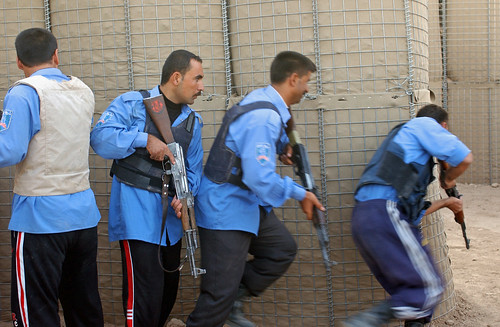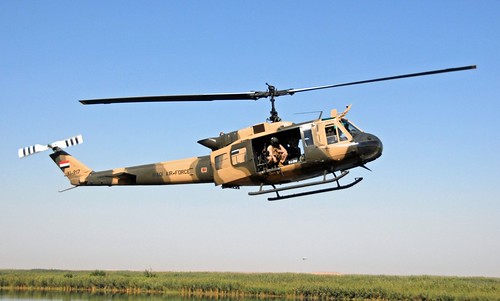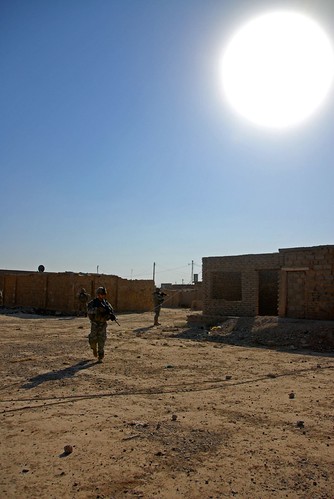The situation in Iraq is incredibly complex -- and the products of the ‘Surge’ are far too fragile to survive a Coalition drawdown (Part 2 of 2)
By Jeff Emanuel
October 23, 2007
**Note: Click here for the rest of Jeff's reports from the front lines in Iraq.**
Click here for Part 1.
Samarra, Iraq
In April and May of this year, and again from the beginning of August through October, I was embedded with the U.S. military in some of the most kinetic combat zones in Iraq, observing Gen. Petraeus’s strategy from the ground level in several different locations – including with the undermanned units and in the sparsely covered areas mentioned above -- and I have seen the outstanding effort being made by the coalition forces there, as well as clear evidence of the strategy’s effects on the overall situation.
I have personally observed public clinics, in which coalition medics and doctors provided Iraqi tribesmen and villagers with a level of care that had been unheard-of in this country even before the fall of Saddam Hussein. I have toured reconstruction sites being worked on by Iraqi contractors, and have ridden along in gun-truck escorts whose job is to protect these men as they work to rebuild their own country – while terrorists, whether to prove some unfathomable point, or simply because, to their deranged minds, it is the correct course of action, try not only to kill them, but to destroy any and all improvements they have managed to provide for their own countrymen in infrastructure and quality of life.
I have sat in on meetings – both above-board and clandestine – with sheiks and tribal leaders, who want the coalition to help them help themselves and their people to achieve better and more secure lives, despite the fact that being seen consorting with the Americans immediately puts a price on each of these leaders’ heads. In these meetings (as well as out on the street), I have heard the concern voiced – more times than I can even count – that the coalition, which currently remains the sole source of stability and security in this country, will give in to the cries from home to abandon the Iraqi people to death, and will finally do so.
I have patrolled neighborhoods with coalition and Iraqi forces, attended elite Iraqi Police training courses conducted by U.S. Special Forces, and gone on operations entirely planned and led by Iraqi Security Forces (ISF). Though these organizations cannot yet hold a candle to their American counterparts in proficiency or professionalism (and will not likely be able to do so at any time in the near future), they are improving, and have scored some major (if inadvertent) successes, including the recent breaking up of an al Qaeda rape and terror ring in Samarra.
I have participated in combat operations which were driven solely by intelligence provided by Iraqi citizens who knew of terrorist plots and personnel in the area and called the Americans to let them know; likewise, I, along with the soldiers whom I have covered, have had my life saved several times by tips from the Iraqi citizenry about IEDs and ambushes put into place to kill us.
Despite the belief of many who desperately long for progress (and for success) in Iraq that these actions and developments mean that victory is assured, and that a corner has inarguably been turned in the struggle to save that nation (in many cases) from itself, the fact is that the popular resistance to the insurgency, such as it is, is an extremely localized phenomenon (as is nearly everything in this diverse, divided, and complex region), and is shared by a much smaller percentage of the population than is needed to actually begin speaking of an Iraq that is even relatively safe, free from insurgents, and on the side of the coalition.
Another highly-publicized problem in that country is that of sectarian tension, which -- urged along by hardline groups like Muqtada al Sadr's Jaish al Mahdi (which has splintered into myriad groups, all of which are out of his control at this point) and its historic enemy, the Badr Brigade -- is still a very real problem. Large areas of Baghdad, which were formerly home to mixed Sunni and Shi'a populations, have seen both violent and voluntary moves toward ethnic homogeneity. In the city, as well as south along the fertile Tigris River Valley to the former Sunni resort city of Salman Pak, members of the Shi'a majority, exercising their newfound freedom and power, have ejected formerly elite Sunni families from their homes, pushing them out into the barren desert. Furthermore, members of the overwhelmingly Shi'a National Police (many of them members of the Jaish al Mahdi in some capacity) have, in many areas, taken it upon themselves to cleanse cities of Sunni individuals and families, acting more as roving death squads at times than as law enforcement officers, and committing what the military calls "extrajudicial killings" (our term would be "murder") in Sunni neighborhoods in the dead of night. This has been an ongoing problem for some time now, though the Iraqi government has recently begun taking greater steps to deal with the problem, including creating the equivalent of an Internal Affairs division within the Ministry of Interior to deal with corrupt and criminal police.
Further, despite reports that the U.S. is prepared to "declare victory against al Qaeda in Iraq," the job is still far from complete – and whether it will (or even can) be completed successfully is far from certain. There remains a large and persistent terrorist population in Iraq, both foreign and homegrown. In Samarra (and the surrounding desert), for example, where I spent the month of September, the ranks of AQI – the number one (and only) enemy in that city – are supplemented by fighters from such locations as Egypt, Syria, Yemen, Saudi Arabia, the Sudan, and even Bangladesh (there have also been rumors of Chechens and other central Asian insurgents in the area, as well), and, though hundreds have been killed by coalition forces, like the hydra more are always ready to take their place in the fight against America and against Iraq.
It is true that, rather than simply taking this terrorist presence lying down, many Iraqis – some (few) of whom are in Samarra, and more of whom are in Baqubah, Fallujah, Ramadi, Salman Pak, Baghdad, and other areas – have shown a great deal of courage, not only by providing an ever-increasing amount of information to coalition forces regarding insurgent activity, but also by working to rebuild what the insurgents have destroyed, as well as by putting their lives on the line to drive terrorists out of their own villages, despite honestly not knowing whether they will wake up the next day to find that the coalition – their one source of protection – has succumbed to those previously mentioned calls from the home front (which are heard loud and clear over here, by civilians and terrorists alike) to leave Iraq, and has abandoned them.
Progress is being made – but much, much more of this must happen if Iraq is even to have a chance at a brighter future.
Given all of these factors, what remains in Iraq is a very long and difficult struggle, and it is very likely that the coalition’s goals – along with its definition of ‘victory’ itself – will have to be revisited, perhaps more than once. Successful and stable nation-building, after all, is a very different – and infinitely longer and more difficult – undertaking than ‘simply’ waging a counterinsurgency (a long and difficult undertaking of its own). Amidst the real but exceedingly fragile gains made by the ‘Surge’ and its accompanying strategy are no guarantees about long-term stability and effectiveness.
While the ‘Surge’ is inarguably having an effect militarily in many different areas of Iraq, the fact is that this country is still broken beyond the comprehension of most people who are sitting comfortably at home in America. To say that there is a great deal of instability, unrest, and upheaval here would be to make an understatement on a massive scale – and, were the U.S. to leave at any point in the near-term future, the vacuum that Mahmoud Ahmadinejad spoke of in the very recent past (which his imperialistic Iran would love to fill) would most certainly become a reality. While social, governmental, and security services are being developed and improved (albeit at what seems to the fast-food culture in the United States to be a snail’s pace), the fact of the matter is that, at this point, the coalition – led by the U.S. – is still the glue holding this humpty-dumpty ‘nation’ together -- a task made infinitely more difficult by the fact that most of those whom we call "Iraqis" actually have little or no sense of being part of a unified nation, nor do they believe that they have a vested interest in any unit outside of their own tribe, clan, sect, or city.
At present, in many parts of Iraq, any situation even remotely resembling stability and security exists – and can be maintained – only as long as coalition units make their daily and nightly trips ‘outside the wire’ and into their sectors of responsibility. Should these forces begin to depart in the near future – or even to pull back to any of the handful of obscenely large ‘Super FOBs,’ as they did under General Casey – then that fragile bit of security and stability which has been achieved will simply crumble, and will do so almost immediately.
For the short term, from my own eyewitness experience, conditions in some areas of the vast (and far more complex than most in our country have the attention span to consider – let alone comprehend) nation that is Iraq are improving – albeit at a pace that would, to our attention deficit-laden culture at home, make a snail seem quick by comparison. Given several more months (or better, years), and the combination of a continuous and active coalition security presence and the establishment and continuation of intensive, ‘quality-first’ training of Iraqi Security Forces (Iraqi Police, National Police, and Iraqi Army), then it may be possible (though it is far from guaranteed) that this country could one day exist in a state resembling that of security and stability – if still home to a large and very prominent coalition presence. Even small troop withdrawals, if not accompanied by the standing up of Iraqi Security Forces who are ready to do so – something which they emphatically are not at this time – will create smaller, more localized vacuums in their own right, and will likely result in the quick undoing of everything that the ‘surge’ has managed to accomplish. Further, if the U.S. were to leave entirely, even a year or two from now, then, based on my time here and observations, I cannot foresee there being anything remotely resembling a positive outcome in the region.
The chaos of an imminent vacuum in the area is a far more likely outcome should the U.S. begin to taper its efforts, and one which will result both in the acquisition of a new home base from which terrorists can stage regional and global attacks, as well as in an even more overt attempt at regional hegemony by the Persian state to the immediate east, who has made very clear that Iraq would only be the first stop on its bloody march to the Mediterranean (and perhaps beyond).
History is an extremely important learning tool, and paying closer attention to its lessons – particularly those regarding the limited ability of power projection and sheer force to win over foreign populations and to successfully build friendly, democratic states – might have led America’s leaders to come to a different conclusion when debating the idea of entering into the Iraq War in the first place. At the very least, the study of very recent history should have alerted those tasked with planning for the aftermath of the successful invasion to the likelihood of such a violent, anarchic vacuum forming in the sudden absence of the one thing – Saddam Hussein – that had kept this country together in the first place. However, the fact remains that the situation here in Iraq is what it is, and cannot be wished, argued, or protested away. Re-fighting 2002 through 2006, while apparently a worthwhile cause to some (most notably so-called “Progressives,” who seem more content to muck about in the unchangeable past than to live up to their chosen moniker), is neither productive nor worth the time and energy spent on it. For the sake of Iraq and its people, and for the sake of the security and reputation of the United States, the focus must be on where to go from here – be it changing certain aspects of the current strategy, or maintaining what is at the moment the most successful direction taken in this country yet – rather than on things that simply cannot be changed.
The present debate comes down simply to this: is America willing to do what it takes to actually succeed in the Middle East, or not? If electoral politics are the metric by which future (and present) courses of action in this war are determined, then this war – and the future wars that failure in Iraq will beget – has likely already been lost. While not guaranteed, victory is, at this point, still possible in Iraq. The opposite, though, is fully guaranteed unless we make the conscious decision not simply to continue going through the motions until a better option, or a more politically expedient course of action, presents itself, but to do whatever it takes to succeed.
The future will be difficult enough, without dwelling on the past. General Petraeus, in his September testimony before Congress, highlighted both the positives and the negatives from this extremely complex, struggling, and broken country, and made his own recommendations for going forward. The current course, despite the paucity of troops both in Iraq and available for deployment, appears – based on the gains made thus far in such a brief time – to be the coalition’s best hope. Adjustments will have to be made, both at home and abroad; an example of one issue which must be addressed very soon is the appalling policy of Army units serving fifteen-month tours overseas (while their sister-service counterparts in the Marines and the Air Force serve seven- and six-month tours, respectively) will have to be revisited very soon, lest the combat backbone of the U.S. military be worn down to an unacceptable level of effectiveness.
However, the fact remains that this struggle, which America entered into voluntarily, is now (even if it might not originally have been) a battle which holds great import for a vital region of the world, as well as for the image, reputation, and security of the United States itself.
Though "victory" – whatever it may look like in its final form, and under its final definition – is far from guaranteed, this is a battle which must be fought with maximum effort and support, to the last day, for the sake of Iraq and of the U.S. Fortunately, if there is a man in the U.S. military with capacity to successfully direct this fight, it the man currently tasked with doing so. If there is to be progress made going forward, both the President and the nation need to listen to everything that he had to say, and that he has to say from here going forward, and to accept his recommendations for what they are: the honest opinion and analysis of the man wrote the book on counterinsurgency, who has the most information of anybody on what is really going on in Iraq, and who only months ago was entrusted by the Senate – by unanimous vote – with the task of winning the fight in Iraq.
To make any less than our best, most concerted, most unified attempt at victory would be to endanger America’s own security and reputation – which, after Vietnam, Beirut, Mogadishu, and the abandonment of the Iraqis whom we told to rise up after the first Gulf War, cannot afford another high-profile blow – as well as to break faith with the diverse, threatened, and disadvantaged Iraqi people, to whom we once presented ourselves as liberators, and to whom we now serve as the one and only chance at a better life, if not at life itself.
Jeff Emanuel, a special operations veteran of Operation Iraqi Freedom, was embedded with the U.S. military in Iraq both in April and May, and from August through October, of this year. His reports, which are 100% funded by reader donations, can be seen at www.JeffEmanuel.com.
2 Comments:
- At 12:43 AM, James said...
-
Jeff-
Eloquent, insightful, and to the point. You have hit the proverbial nail on the head. Thanks.
www.greensrealworld.blogspot.com - At 7:02 AM, said...
-
An outstanding essay on both the current situation and the reason for us to maintain a strong, proactive presence in Iraq. Thank you Jeff for your insightful reporting. Ralph Smith

